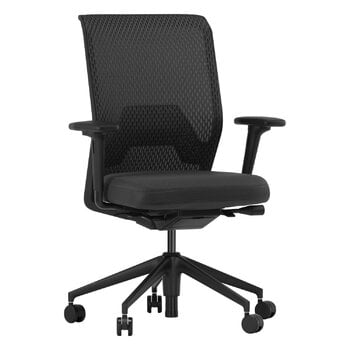Vitra’s ID Mesh is an elegant task chair designed by Antonio Citterio that, due to its features, is very well suited for even longer periods of sitting. A study conducted by the Institute for Biomechanics at the Swiss university ETH Zurich found that chairs in the the ID range prevent health problems by activating muscles in the abdomen and back as well the lower spine. The soft seat and supportive backrest make the chair comfortable even without adjustments, but the adjustable height, seat depth and armrests help in making the chair optimally ergonomic for each user. The chair is also equipped with a forward tilt mechanism, backrest resistance and lumbar support, all adjustable. The backrest of the ID Mesh chair guarantees air flow even in higher temperatures.
ID Mesh task chair with 2D armrests, black
Vitra
Description
Vitra’s ID Mesh is an elegant task chair designed by Antonio Citterio that, due to its features, is very well suited for even longer periods of sitting. A study conducted by the Institute for Biomechanics at the Swiss university ETH Zurich found that chairs in the the ID range prevent health problems by activating muscles in the abdomen and back as well the lower spine. The soft seat and supportive backrest make the chair comfortable even without adjustments, but the adjustable height, seat depth and armrests help in making the chair optimally ergonomic for each user. The chair is also equipped with a forward tilt mechanism, backrest resistance and lumbar support, all adjustable. The backrest of the ID Mesh chair guarantees air flow even in higher temperatures.
Product details (11)
- Colour
- Black
- Width
- 70–75 cm
- Measurement details
- Width: seat 48.5 cm
- Depth
- 56.5–79 cm
- Height
- 97–109.5 cm
- Seat depth
- 40–45 cm
- Seat height
- 40–52 cm
- Frame material
- Polyamide
- Seat cushion
- Polyurethane foam
- Upholstery fabric
- Seat: Silk Mesh nero: 67% polyester, 33% polyamide; Backrest: Diamond Mesh nero: 100% polyester
- Base material
- Polyamide
- Product ID
Designer
Antonio Citterio (b. 1950) is an Italian designer and architect who is renowned internationally. He graduated in architecture from the Milan Polytechnic and since 1972 has worked for many leading manufacturers such as B&B Italia, Kartell, Vitra and Iittala.
Between 1987 and 1996 he worked in association with Terry Dwan and, together, they created buildings in Europe and Japan. Among his most significant works the restyling of a block in the historical centre of Seregno, Esprit headquarters in Amsterdam, Antwerp and Milan, industrial plants for Vitra, in Germany, and for Antonio Fusco, in Milan. He has also been engaged in architectural works dealing with construction projects and interiors both in Italy and abroad. He holds lectures and conferences all over the world and his work has been extensively exhibited and published. For Iittala he has designed, together with Glen Oliver Löw, the Citterio 98 cutlery in 1998 and the utensils for the kitchen Collective Tools in 2000. Antonio Citterio has won many prizes, among which the prestigious Compasso d’Oro in 1987 and 1995. His products are part of the MoMA permanent collection and of the Centre Georges Pompidou in Paris.
Reviews (0)
Sustainability
The Product Sustainability Framework, our criteria of sustainable design, helps you find the most sustainable products in our selection. Read below which sustainability criteria this product has met.
Working conditions & labour 7/9
-
Equal opportunities for all employees
-
Commitment to UN Global Compact, fair compensation for all employees
-
Corporate responsibility requirements defined and communicated for suppliers
-
Systematic work for improved inclusion and well-being in the workplace
-
Transparent supply chain
-
Suppliers' compliance to a code of conduct ensured
-
Compliance to the UN Guiding Principles on Business and Human Rights ensured in the supply chain
-
Direct suppliers audited and certified
-
Support for community involvement in the supply chain
Eco-friendly production 7/9
-
Fair and resource-wise water-use in production
-
No incineration or landfilling of returned items
-
No use of endangered species as materials
-
No direct environmental emissions or waste (excl. GHGs) from production
-
Production and material sourcing that respect biodiversity, animal rights, and natural ecosystems
-
Material-efficient and ecological packaging
-
No potentially harmful chemicals used in own production
-
The sustainability of direct suppliers' production is addressed and monitored
-
Positive impact on nature’s well-being through operations that regenerate natural ecosystems
Climate impact 6/8
-
Company's direct greenhouse gas emissions identified and commitment to reduction
-
Product's carbon impact identified and commitment to reduction
-
Guidance on energy- and eco-efficient use of the product
-
Contribution to climate initiatives beyond the brand’s direct operations
-
Carbon footprint of the product calculated and goals set to reduce it
-
100 % renewable energy in own production and operations
-
Low-carbon or compensated transportation
-
Carbon neutral or carbon negative product
Sustainable materials 5/6
-
Sustainable and long-lasting material choices
-
No harmful or hazardous substances
-
Responsible raw material sourcing and production
-
Materials suited for circularity: monomaterials, recyclable finishings, renewable or recycled contents etc.
-
Ecological materials: natural, biodegradable, recyclable or recycled contents
-
Outstanding materials in terms of innovativeness, responsibility, sustainability and circularity: local production or sourcing, 100 % recycled content, C2C-certification etc.
Circular design 5/5
-
High aesthetic quality promoting long-term use of the product
-
Technically durable product design and material choices
-
Design for enduring life-long quality
-
Design and support for product maintenance, repair and upgradability
-
Innovative circular design solutions: circular service system, resale platform, remanufacturing, collection of used products, etc.




